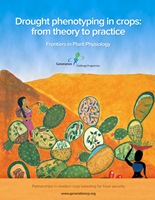Inspiring change: media mix for International Women’s Day 2014
- Published Date
 March 8th is International Women’s Day, to raise awareness on equity for women.
March 8th is International Women’s Day, to raise awareness on equity for women.
This year’s global theme is Equality for women is progress for all, and we're also drawn to the sub-theme Inspiring change. Here at GCP, to prime the pump of inspiration, we celebrate our women science leaders who daily live this theme, serving as inspiration to others.
To know how GCP women science superstars are faring and beating the odds to succeed in science despite the status quo (statistics show science is still predominantly a man’s world), hear it directly from them in their own authentic voice.
We are delighted to bring you sights, sounds and stories of inspiration in our ‘Multimedia Expo’ profiling a selection of 10 GCP women science leaders from all around the world, as well as the latest UNESCO global statistics on women in science.
Synchronised symphony strikes a high note: blogpost quartet perform GCP’s signature tune on the spirit of sharing
- Published Date
Rallying the crop-breeding community at the IBP crossroads to cultivate change, trust and a technological transformation
 The Integrated Breeding Platform (IBP) is GCP’s flagship initiative, being a web-based one-stop shop for information, analytical tools and related services to design and carry out integrated breeding projects. But what exactly does that mean? The four afore-mentioned blogposts go a long way to putting several fundamental facets of the IBP into sharp focus…
The Integrated Breeding Platform (IBP) is GCP’s flagship initiative, being a web-based one-stop shop for information, analytical tools and related services to design and carry out integrated breeding projects. But what exactly does that mean? The four afore-mentioned blogposts go a long way to putting several fundamental facets of the IBP into sharp focus…
 |
| Arllet Portugal |
 |
| Mark Sawkins |
 |
| Yemi Olojede |
 |
| Graham McClaren |
In the second movement, we speed up the tempo to run with the champions supporting molecular-breeding techniques in developing-country programmes, under the expert baton of Marker Maestro, Mark Sawkins, Manager of IBP’s Breeding Management System (BMS). In this post, Mark regales us with tales of virtuosity in plant genetics, integrated breeding, and we learn all about Mark’s workbench, the BMS, which recently released its reloaded version revealing an array of improvements and incorporating user feedback. You can learn how Mark is the musical bridge to this piece – linking researchers with BMS technology, engaging local heroes and heroines to champion the cause of molecular breeding technology adoption, and undertaking crucial and amicable interaction with the private sector – all played in the right key. More
Staying with the pace, but building to a crescendo, our third movement gives a clear insight into an African agronomist’s first-hand experience of working with the IB Fieldbook. Yemi Olojede (of Nigeria’s National Root Crops Research Institute – NRCRI) first had a personalised prelude to agriculture from his father, a Nigerian cocoa farmer, which instilled in him a love for all growing things. He is now the Coordinator-in-charge of the Cassava Research Programme at NRCRI, a Super-User of the IBP, and more specifically of the IB Fieldbook. Yemi’s role as conductor is crucial as he coordinates an entire orchestra of diverse African researchers, bringing them the latest IBP technology, instructing them to use electronic tablets to input data directly in the field, and much more…
And so we come to the grand finale of our musical-technological interlude with a befittingly stately movement, an adagio – literally meaning ‘at ease’ – and who could be more ‘at ease’ with the whole IBP symphony than Graham McLaren, GCP’s Bioinformatics and Crop Information Leader, Chair of the IBP Workbench Implementation Team and member of the IBP Development Team? Graham has been a part of the IBP since the first melodic notes were scribbled and struck, way back in 2009. In this blogpost, he takes us back to before the era of IBP’s creation to explain how and why the initiative came into being, and how it provides that all-important common rehearsal room for the crop-breeding community. Once more, he keeps score on the people at the heart of IBP – from users to trainers to funders and partners, and goes beyond, into IBP’s Phase II and the future. More
As an encore, our audience is encouraged to click on the links in the footnotes of every piece, to delve deeper into the harmonious sounds of IBP. Pleasant reading!
And if you’re intrigued by the ‘GCP spirit’ in matters scientific that brought this all to be, all is explained here.
4th international workshop: Next-generation genomics and integrated breeding for crop improvement
- Published Date
 In collaboration with the International Crops Research Institute for the Semi-Arid Tropics (ICRISAT) and other partners (India's Department of Biotechnology; the CGIAR Research Program on Grain Legumes and the CGIAR Research Program on Dryland Cereals), GCP is organising the 4th international workshop on Next-generation genomics and integrated breeding for crop improvement (NGGIBCI–2014), to be hosted by ICRISAT at Patancheru (India), from 19th to 21st February 2014.
In collaboration with the International Crops Research Institute for the Semi-Arid Tropics (ICRISAT) and other partners (India's Department of Biotechnology; the CGIAR Research Program on Grain Legumes and the CGIAR Research Program on Dryland Cereals), GCP is organising the 4th international workshop on Next-generation genomics and integrated breeding for crop improvement (NGGIBCI–2014), to be hosted by ICRISAT at Patancheru (India), from 19th to 21st February 2014.
In the words of workshop organiser, Rajeev Varshney, "We are pleased that the programme of this meeting is scientifically rich, with more than 150 scientists from 20 countries scheduled to attend the workshop."
GCP Director, Jean-Marcel Ribaut, will on 21st February deliver the workshop's concluding lecture entitled Adoption of modern breeding tools in developing countries: challenges and opportunities. (Editorial addittion, 12th March 2014: see the lecture in slides, or on video)
Workshop programme and more details are on the ICRISAT website, and the workshop will be on live telecast, based on Indian time indicated on the workshop programme.
Relevant links:
- Comparative and applied genomics (Theme)
- Genomics Research Initiative
- Blogposts on crop genomics
- Agricultural Genomics Network on IBP
- Integrated Breeding Platform (IBP)
Blog – Feast your eyes on videos on rice research, celebrating community life at GCP!
- Published Date
 Hungry for news on GCP’s rice research? We highly recommend savouring the flavours expertly blended in this new kid on the blog raving about rice from Africa to Asia.
Hungry for news on GCP’s rice research? We highly recommend savouring the flavours expertly blended in this new kid on the blog raving about rice from Africa to Asia.
The first round comes in the form of a seven-course video banquet featuring Marie-Noëlle Ndjiondjop, Principal Investigator (PI) of GCP’s Rice Research Initiative in Africa, and Senior Molecular Scientist at Africa Rice Center, who succinctly explains recent goings-on in the rice research kitchen in Africa, where her sure-fire step-by-step molecular breeding recipe has been reaping rewards.
 Same theme, different continent: bye bye Africa, and hello Asia! As a perfect accompaniment to this sizable starter from Marie-Noëlle, we transport your taste buds to Asia to savour a video brimful of capacity-building knowhow entitled Molecular rice breeding in the Mekong region from the National Center for Genetic Engineering and Biotechnology (BIOTEC), Thailand. GCP and BIOTEC joined forces in the capacity-building corner of the rice research kitchen through a GCP-funded project led by PI Jonaliza Lanceras-Siangliw (BIOTEC).
Same theme, different continent: bye bye Africa, and hello Asia! As a perfect accompaniment to this sizable starter from Marie-Noëlle, we transport your taste buds to Asia to savour a video brimful of capacity-building knowhow entitled Molecular rice breeding in the Mekong region from the National Center for Genetic Engineering and Biotechnology (BIOTEC), Thailand. GCP and BIOTEC joined forces in the capacity-building corner of the rice research kitchen through a GCP-funded project led by PI Jonaliza Lanceras-Siangliw (BIOTEC).
A small but perfectly formed digestif is the last offering from our spicy spread with a blast from the past in the form of a BBC video showcasing some vintage GCP rice research.
A theme cutting across all the videos is the benefit of partnerships and collaboration. But enough now on introductions! On to the feast! So, without further ado, enjoy all the richness of our video rice-fest right here!
Phenotyping compendium takes research beyond new Frontiers
- Published Date
 In the pioneering spirit which has marked GCP since the outset of its adventure (see our efforts in 2008 in this self-same area), we are pleased to bring you good news on the republication in 2014 of chapters from GCP’s 2011 volume Phenotyping in crops: from theory to practice. The original comprehensive tome continues to be sought after by experts in the field, both for personal research, learning and teaching purposes, and is available here.
In the pioneering spirit which has marked GCP since the outset of its adventure (see our efforts in 2008 in this self-same area), we are pleased to bring you good news on the republication in 2014 of chapters from GCP’s 2011 volume Phenotyping in crops: from theory to practice. The original comprehensive tome continues to be sought after by experts in the field, both for personal research, learning and teaching purposes, and is available here.
As the world of crop research evolves so rapidly, at GCP’s 2011 General Research Meeting in Hyderabad, India, communal conversations on communication commenced on the possibility of republishing chapters from the 2011 book to incorporate updated research and new findings with an open-source online publisher, Frontiers.
This plan was endorsed in group discussions, and, though not all chapters from the original book were republished, the idea came into fruition with the republication of nine crop chapters and seven chapters from the methods section, as a Research Topic in Frontiers in Plant Physiology. All republished chapters are publicly available to view or download free of charge either on our website in a variety of formats, or as an e-book on the Frontiers website.
As GCP moseys into the sunset, it continues to blaze a trail in the challenging field of phenotyping, paving the way for future generations.


